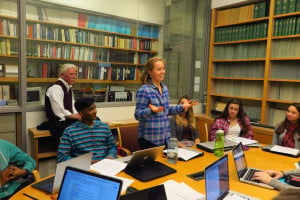
CHEM 28N: “Science Innovation and Communication” is a freshman Introductory Seminar on making scientific issues and knowledge relatable to share with broad audiences. The class addresses this challenge through the lens of scientific journalism, allowing students to write on topics ranging from three-parent babies to traditional Chinese medicine to anti-aging research.
Professor of chemistry Paul Wender first offered the class last year to teach the importance of scientific journalism and the skills behind it.
“One of the biggest challenges that we have is not necessarily understanding science or advancing science, but rather sharing the excitement of science and its potential,” he said. He emphasized the importance of effective communication with policy makers and budget setters, due to their roles in funding and shaping the future of scientific research.
While CHEM 28N is the first introductory seminar to focus on the subject, technical writing holds a place of high importance in Stanford’s engineering curriculum. Each major in the School of Engineering requires students to take a ‘Writing In the Major’ (WIM) course. Technical writing is also the subject of an online course taught by Stanford Medical School professor Kristen Sainani since 2003.
The class starts with students identifying puzzles and innovations they find intriguing. After research and interviews, the students explain their topics in articles intended to be relatable to the average reader. The class culminates with their work being published in the class’ own online science publication, ‘FASCINATE’.
Wender’s message about the importance of technical writing has resonated with students. Liza Manzanete ’19, a student in the class, emphasized the need to make science accessible to students. She believes that good communication can make enthusiasm for science infectious.
“I went to a somewhat academically stagnant high school, and it was just very frustrating being one of the only students who actually cared about science,” Manzanete said. She explained that many of her peers had trouble applying science to their lives since science was never presented to them as being relatable.
In CHEM 28N, Manzanete has found the community of science enthusiasts she was missing.
“I look forward to this class because we just come and say, ‘Wow, science is cool,’” she said.
Wender began the course by lecturing on some of the scientific topics he finds most exciting. These ranged from the very serious — eradicating AIDS and treating Alzheimers — to the more lighthearted, like explaining why fish is always served with a lemon wedge.
For Wender, the lemon wedge question demonstrates a story’s power to travel and spread. He recalled sharing the anecdote with an organic chemistry class many years ago. Two days later, he introduced himself to a colleague who recognized him as “the person with that fish story.”
“[Students] will sit down at a table and have fish, they will have that wedge of lemon, and they will become the storytellers,” Wender said. “This is infectious education.”
While the class is very student-driven, with students taking on the initiative to source and create content, students emphasized Wender’s help and support through the challenging processes of finding sources and conducting interviews. Amanda Urke ’19 joked that Wender name-dropped at least eight Nobel Prize laureates on the first day of class, and she marveled at the leading professionals he has helped class members get in touch with.
The class gives students the opportunity to give each other feedback on draft articles as well as the chance to present one-minute ‘elevator pitches’ of their long stories. Topics this quarter span a wide area of interests, ranging from Manzanete’s work on high prices in the pharmaceutical industry, to Matt Shimura ’19’s work on the implications of sea level rise. Some topics were closer to home, like Urke’s investigation of helmet use on campus, looking at why students eschew them and possible remedies.
Students are currently working on their drafts, and have started to plan their online publication, which will go live on Dec. 2.
Contact Hannah Knowles at hknowles ‘at’ stanford.edu.